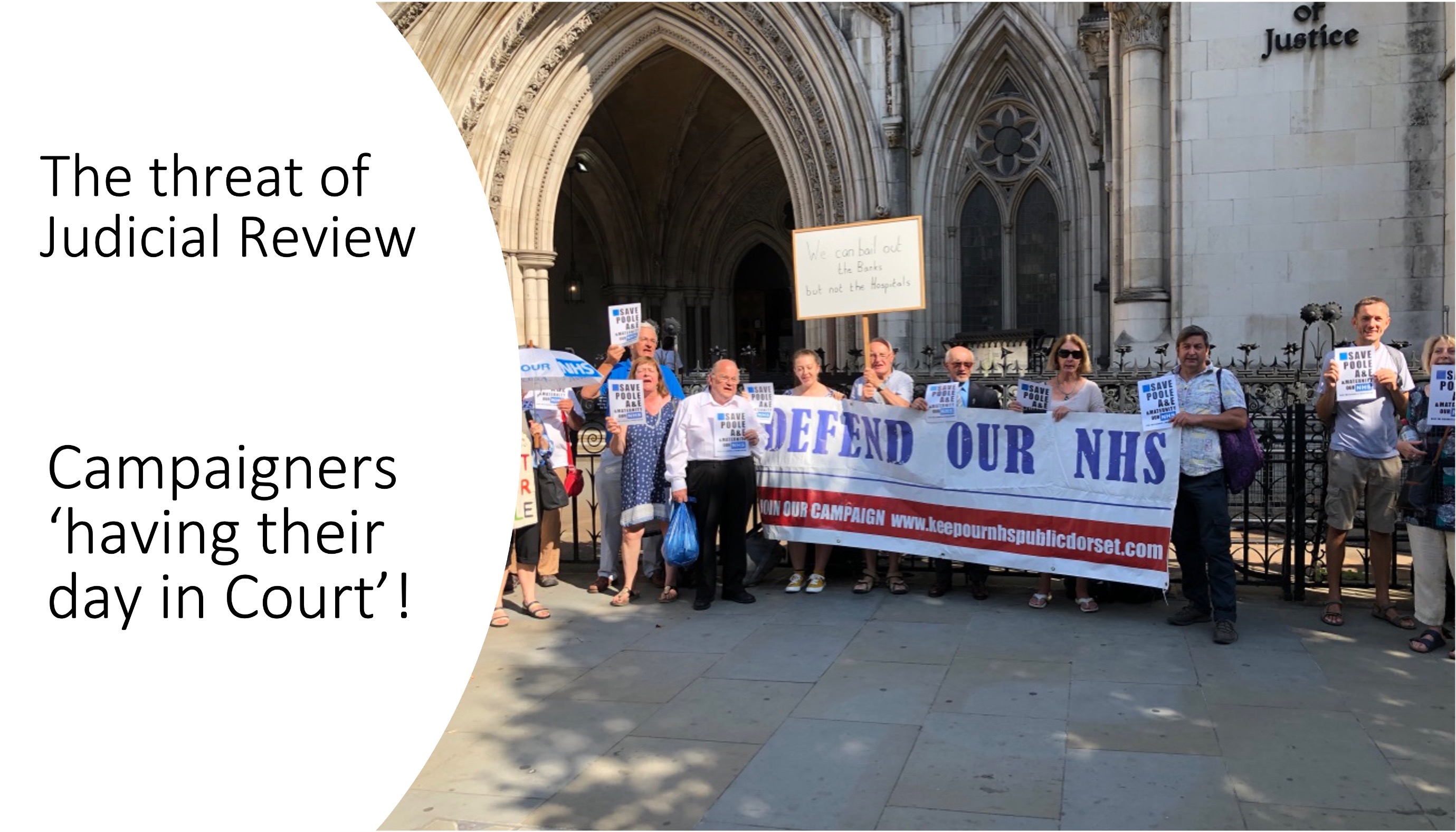This is Blog No. 22
On any given week in the UK, the media will report three or four stories of organisations or individuals announcing that they intend to seek a Judicial Review alleging a failure to consult adequately.
Only a few of these ever get to Court.

Among this week’s crop of typical stories are the boat residents of Bristol, who are fighting to prevent a major increase in mooring fees. There seems to be some engagement, but campaigners argue that the council’s ‘drop in events’ were “no substitute whatsoever for thorough public consultation prior to decision making”.
Another – also in the West Country - is the Exeter branch of Mencap which seeks to challenge plans to cut adult day and respite services by Devon County Council. Their solicitors, Leigh Day – veterans of dozens of consultation law cases, has just submitted a 27-page ‘letter before claim’, so this sounds perfectly serious.
Elsewhere, Bournemouth Council which featured in my blog last week is now facing a legal challenge from Cycling UK over the re-opening of a bridge that was closed during the pandemic. And of course, we are all waiting to see if the threatened judicial review on Sadiq Kahn’s plans for London’s Ultra Low Emissions Zone (ULEZ) by Harrow Council and others will actually go ahead.
There are probably twenty other on-going threats of legal challenge right now. How effective are these?
The first thing to note is that a consultation-based legal challenge is not always about the law. It is about politics. Attempts to intimidate decision-makers to think again, or to modify their proposals. Many otherwise robust politicians are squeamish about a full legal onslaught in the High Court. Even if they win a case, reputational damage can arise if public bodies can be shown as careless, inefficient, or just unresponsive to public opinion. Many threats of judicial review have little realistic chance of success. Note the difference between a news story where a campaigner ‘calls for’ a legal challenge and reports of a ‘letter before claim’, prepared by a reputable firm of solicitors – as above. In recent weeks several publicity-seeking Councillors, unhappy that asylum-seekers are staying in local hotels, (and maybe wishing to strengthen their case for re-election in May), have exhorted their Councils to issue a legal challenge on the grounds of a lack of consultation. So far, this remains mostly a political not a legal initiative.
The second point is that one of the main inhibitors of judicial reviews is disappearing. Time was when local campaigners would simply be unable to raise the necessary funds to mount a legal challenge, for the costs can be considerable. Crowdfunding is changing this. If you go to the Crowdjustice website this weekend, one of the first items is about a campaign by the Good Law Project under the headline The River Wye is under threat. It then says that there are 10 more days to go and that so far, there have been 2,066 pledges made – raising £51,465 against a target of £57,000. By taking this approach, campaigners attract new supporters to their cause and engineer effective media coverage for their arguments. In the meantime, prospective defendants inevitably start examining whether their consultation/engagement complied with all the rules or ask themselves if they might they be vulnerable if it ever gets to Court.
Third, and finally, experienced lawyers realise that victory can take several forms. There have been many occasions where shiny new Government policies have faced judicial review but where claimants have lost, and yet, somehow the policy was never implemented. These are cases where having the argument in public exposes weaknesses that no-one had previously noticed. Whipped Parliamentarians have wryly reflected upon the fact that they have voted for flawed initiatives that unravelled not in Parliament, but in the Courtroom. We had a recent example (see my commentary on the Holland Park school case) where the Department of Education ostensibly won the case, but inadvertently the Teaching unions came away having, for the time being at any rate, established that proposals to change the status of Academy schools will need parental engagement to the full rigour of the standards required of a public consultation.
And so it is that threatening a judicial review is a very attractive option for opponents of proposals that should be or have been the subject of consultations. Over the next two to three years, I predict even more activity of this kind as environmental groups and others cross swords with Councils and other public bodies and demand better opportunities to argue their case.
The best managed public bodies understand this and are taking steps to strengthen their defences. That does not just mean beefing up their legal teams, many of which know rather little about consultation law. It means better preparation for politically sensitive issues where anticipating the politics can help design the public dialogue in ways that minimise impacts, promote mitigation and reduce the scope for effective legal challenge. The Mayor of Plymouth, who resigned last week over a failure to consult sufficiently over the trees in Armada Way – might agree this would have been a good idea!
Meanwhile why not join me in counting how many threats of judicial review make the headlines in the coming weeks? I’m sure the number will increase.
Rhion Jones LL.B has monitored and written commentaries on the Law of Consultation since 2007 but does not provide legal advice. He will, however, be happy to discuss the content of this or any other commentary.
For More like this - free of charge: SUBSCRIBE now
NEW: Use Rhion to brief you on Consultation law
Leave a Comment
I hope you enjoyed this post. If you would like to, please leave a comment below.